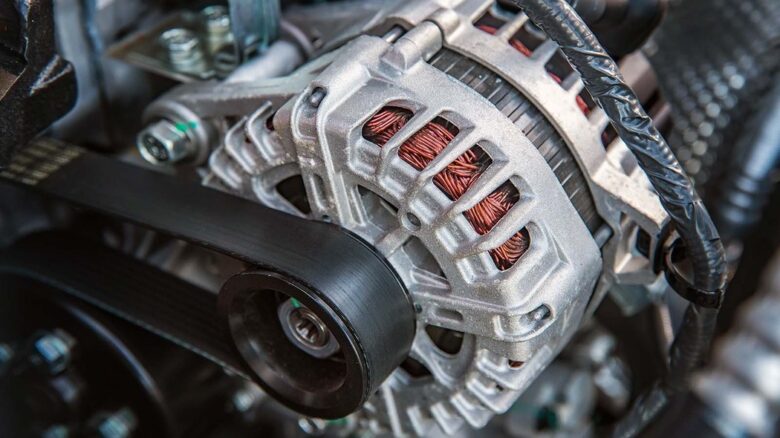It is the alternator of a vehicle that stands as one of the integral components in ensuring every system of the vehicle works flawlessly. It does this by supplying the requisite voltage to the electrical system of the vehicle and also charging the battery in the process. But it is worth noting that this component too can degrade with time or even malfunction. Any malfunction not addressed on time can turn into an unpleasant breakdown, which is often accompanied by hefty repair costs. Therefore, it is vital to be on the lookout for these signs to maintain the performance and reliability of the car. Let us explore these signs so that the next time you are out on a ride, you can be carefree of all the potential issues that may arise in the future.
Signs of a Bad Alternator:
What quickly depletes is the vehicle’s alternator, as it acts as the main supply of the vehicle’s electrical requirements. Once it does start to run low, you may notice some worrying signs.
- For one, flickering or even dimming cabin lights and dashboards would suffice as warning signs to prepare for further changes.
- There exists a high likelihood of peculiar sounds emitting from the engine. For example, whining or grinding sounds could be indicators of a dysfunctional bearing or a showcasing of wearing within the alternator.
- The key is stuck in the ignition only to try twisting it towards the power position again and again only for the key to get loose is yet another evident pointer towards an out-of-power supply to the vehicle.
- Observe electrical devices such as power window switches that are malfunctioning or responding slowly alongside the stereo system since such conditions are indicative of a failing alternator.
Unusual Noises and Odours:
The problems with the alternator can often be evident in the form of odd sounds, and if worn bearings or internal damage are present, one may hear weird noises such as grinding or whining. These concerns should not be neglected, as they may have an adverse effect in the future.
Additionally, never ignore smells, as they can be just as dangerous as slight heating owing to components present in the alternator. In case a burning odour is noticed, immediate action needs to be taken to avoid bigger issues in the future. Such a combination of neglecting the noises and odours can increase the severity of the concern even further. Never wait for the scenario to worsen and deal with it as soon as it appears, as it will save you time and effort in the future.
Dimming or Flickering Lights:
Dimming or flickering of lights is a clear indication that there is a problem with the alternator. Three circumstances seem to stand out: firstly, when the alternator is not working properly enough to be able to provide the battery with the required supply of power, you might notice your headlights dimming while idling or flickering when the vehicle accelerates. This is mainly because there is a constant variation of the voltage being supplied. Quite evidently, the specific structure of these electrical systems cannot function properly without an adequate and stabilised power supply. And if it fluctuates, there are well-known signs of it—in the case of an automobile, they will be manifested in the form of the lights of that vehicle.
Moreover, it is important to examine how the rest of the lights behave on the dashboard; if they are flickering in combination with other issues, it is advisable to check the alternator and the connections connected to it. Ignoring these fluctuations could result in greater electrical problems in the future. Every now and then, examining the lighting of your vehicle can prevent future problems. It is essential to understand that there are times when lights mask other issues under the bonnet.
Difficulties in Engine Start-Up:
Experiencing difficulties in starting your engine can indeed be a very disheartening feeling. That is also indicative of other issues and, in some cases, alternator problems. Most of the time, a malfunctioning alternator fails to charge the battery adequately. You may turn the key to start the engine or the button and get nothing or just some clicking sounds. Sometimes, you might observe that after a series of starting attempts, the vehicle does indeed fire up but in a lazy fashion. This should not be the case. In instances where you have recently fitted a new battery and the vehicle still will not turn over, I would suggest you get your alternator looked at. These two parts of the car are essential in the making of a single step of the ignition switch.
Be on the lookout for other symptoms, as well as dimmed lights while cranking the engine, which may be an indication of defective electrical wiring in your vehicle that is caused by poor alternator functioning. So please be cautious about this, especially while driving around the city or in those morning rush hours.
Alternator’s Effects on Different Electrical Components:
- When your alternator begins to cultivate problems, there are some signs that hint towards malfunctions in some vehicle electrical components. These components are always dependent on getting the correct flow of electricity. If there is a fault in the alternator, then they are also going to be faulty.
- It is quite possible that you notice audio in your radio cuts off intermittently or is lower in volume compared to what you are used to. This anomaly is a clear indication that something is not right.
- Power windows can also misbehave under certain conditions, such as an unsatisfactory voltage supply from the alternator, whereby they move slowly or do not work completely.
- Also, the dashboard lights are quickly turning on and off at random, which can be concerning. It is not just an irritating issue; it can also mean that there can be problems developing within the engine.
- If all the other integrated electronic devices begin to exhibit unusual activity, i.e., devices start charging sporadically, then it may be time to check the alternator. Identifying these warning signs can save you from getting into dire situations later on.
Frequency Cortez and Alternator Replacement:
The alternators never go out forever, but the negligence of failing to properly service them regularly will drastically diminish their life expectancy. An alternator that is in good condition can always deliver charge to the battery, sustain a constant state of charge, and provide sufficient power to the electrical components of the car. Belts and connections should be checked regularly every month for wear. The loosening or wearing thin of belts can cause a drop in power output. Tightening them may prevent a few issues from worsening.
Always check if the charging system has a problem with one or more of the warning lights on the dashboard. These are important early signs of trouble. Replacing a worn-out alternator can not only save you from repairs but from ever having to deal with a situation where it has broken down. They are advised to check this range as a part of the normal service. If you observe a failure onset, go out and seek help at the earliest. Taking appropriate, timely action is important to ensure the smooth functioning of your vehicle.
Conclusion:
It is very important to take cognizance of matters related to the alternator of your vehicle. Never ignore them, because what seems trivial at the moment, such as a simple lightbulb not working, could be part of a complex house wiring system that includes lights and fans. Sticking to the schedule and guidelines will do that and also save you time and money. A great part of regular check-ups is the ability to notice warning signs and feel in control. This gives you the confidence to address a scenario swiftly where things feel not right.
The electrical wiring of the body of the car would be easier to deal with coming out and in so as to assist in repairing the vehicle overall, increasing the safety of illegal driving and all over. Make sure you are always concerned and take care of your vehicle Don’t ignore the little things that could go a long way in helping the vehicle along the road without issues.
FAQs:
1. For how many miles is an alternator expected to function?
An alternator is said to be operational for a minimum of 80,000 miles and a maximum of 150,000 miles, which is conditional upon the driving conditions and the maintenance of the alternator.
2. Is it safe to operate a vehicle equipped with a faulty alternator?
Not being able to lose all electrical connectivity, which can cause a vehicle to be stranded, is not a reason to caution against this action, so a vehicle ought not to be driven if an alternator is not functioning properly, as it may increase the risk involved.
3. What can make an alternator stop functioning?
Belt wear, heat, debris exposure, and loose connections of wires to and within the belts are all linked with causing damage to components of the alternator and making it cease functioning due to inevitable damage over time.
4. With the use of a multimeter, how can one check the voltage of an automobile’s alternator?
When the electric system of a car is working properly, the created voltage can easily be measured at the battery terminal while the engine is running using a multimeter and has a range of 13.7 to 14.7 volts.
5. If an alternator is not working, would the battery need replacement as well?
This is linked to the duration for which an alternator was being used in a dysfunctional state due to the possibility of a battery that opposes charging being deep cycled, which results in both components requiring replacement frequently.




